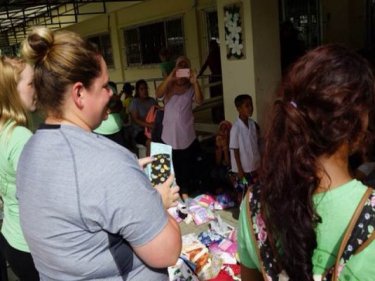The group, among 78 women and children being housed at a family shelter in Khao Lak, are believed to have been tempted to flee the shelter by two ''translators'' from Bangkok who visited with NGOs a day earlier.
When the NGOs returned to the capital, the ''translators'' stayed on. One of the key issues in the human trafficking of Rohingya in Thailand has been the lack of trustworthy translators.
With the price of Rohingya trafficked for ransom at about 60,000 baht a head, young women of marriageable age are sure to fetch much higher prices at auction among male refugees already in Malaysia.
Officials at the Phang Nga Family Shelter could see signs that the women were preparing to leave after the ''translators'' visited. Last night, soon after the escape, a boy ran and told staff.
Reacting quickly, local anti-trafficking volunteers and police followed the shelter staff into the plantation in the rain and apprehended the young women, most of whom are still teenagers.
They had been at the shelter for between six months and eight weeks, awaiting determination by NGOs for placements in a third country.
Some of the women with children hope their husbands, now in Malaysia, will join them in the thirds country.
The family shelter provides the Rohingya women and children with a supportive network and it is a low-security facility. But boredom and the desire to find a new future are constantly on the minds of the detainees.
Only recently, with the crackdown on trafficking in Thailand, have the regular escapes finally been halted.
The rewards remain great and trading in humans, once a secret but lucrative industry rivalled only by tourism along the coast north of Phuket, is plainly not dead yet.
To prevent future escapes, staff at the shelter hope to establish a 24-hour watch by a much-acclaimed group of local volunteers in the neighboring town of Takuapa.
In October the volunteers set up a 24-hour checkpoint on the main coast road. The unique ''human trafficking checkpoint'' is credited with cutting the traffickers' main route south after years of lax enforcement.
The Rotary Club of Patong has become deeply concerned about the welfare of the women and children in the shelter north of Phuket and is helping them to learn crafts and establish a vegetable garden.
Under the Youthline project, a large group of college students from Salt Lake City in Utah has been working for weeks with Patong Rotary to provide practical solutions to enhance the lives of Burmese families in the region, as well as the stateless and forlorn Rohingya.
Patong Rotary president Brad Kenny, who led a previous project that helped the impoverished sea gypsies further north off Ranong to gain proper toilets, electricity and water supplies, is setting high standards in caring for the Andaman's most needy.
Practical solutions that accept the difference between cultures are now being applied.
The American students were able to give the women sanitary kits and training in how to use the washable and environmentally-friendly necessities.
Earlier in the day, a group from Saudi Arabia generously provided washing machines and other gifts.










A slamming indictment that this problem is far from over. Maybe more eyes on than usual ... but selling young women is obviously still worth the risk. So sad.
Posted by James on July 12, 2015 09:41